|
|
|
Sort Order |
|
|
|
Items / Page
|
|
|
|
|
|
|
| Srl | Item |
| 1 |
ID:
110492


|
|
|
| 2 |
ID:
110490
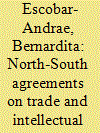

|
|
|
|
|
| Publication |
2011.
|
| Summary/Abstract |
This article lays out qualitative and quantitative information of the extent of intellectual property (IP) protection reached by industrial property related sections of US bilateral trade agreements (TAs) agreed during 2000 decade. The paper classifies IP protection provisions of such TAs. Their extent of protection is measured through the identification of 'shall+' commitments, i.e. compulsory commitments that imply protection beyond WTO-TRIPS benchmark. The metrics built highlight the fact that despite significant similarities in structure and content found across TAs, there is a notable dispersion in the extent of protection they contain. Indices produced show that pharmaceutical provisions comprise a significant part of 'shall+' commitments of such agreements. This finding supports the hypothesis of pharmaceutical industry's success in setting the agenda for US international trade and IP policy1 and the role that IP protection plays in such industry.2, 3 The extent of IP protection is highly correlated across IP categories and they reveal that Chile agreed to the lowest number of such commitments, whilst Oman and CAFTA agreed to the greatest number of such provisions. Duration of negotiations appears to be negatively and significantly correlated with indices for patent and data protection for pharmaceuticals. This finding suggests that such provisions indeed became the core of the negotiations, and countries that strove to limit their inclusion, succeeded partially.
|
|
|
|
|
|
|
|
|
|
|
|
|
|
|
|
| 3 |
ID:
110487
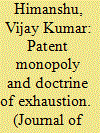

|
|
|
|
|
| Publication |
2011.
|
| Summary/Abstract |
A patent is granted for an invention that is novel, non-obvious, and has an industrial application. The proprietor of the patent grant is able to exploit and control the use of patented matter. Patent as a form of personal property may be assigned, licensed, mortgaged and may devolve by operation of law. The patent exhaustion doctrine, also known as the first sale doctrine, operates to 'exhaust,' or extinguish, the exclusive rights of sale and use as to patented articles sold with the patent owner's authorization. In this background, this article develops the concept of exhaustion and surveys the nature, scope and ambit of the doctrine of patent exhaustion. The relevance of doctrine and right of exclusivity is thoroughly discussed with regard to commercial transactions involving licensing, assignment, sale, disposal or offer of disposal of the patented articles. The article concludes that those conditions which are within the scope of patent monopoly act as limits on the doctrine of exhaustion of right in the sold goods. The exhaustion of right is limited to patented goods, therefore the purchaser has all rights except right to reconstruct. This article while discussing the doctrine from international and national perspective suggests rethinking of the nomenclature of doctrine of exhaustion as contained in Article 6 of the TRIPS Agreement.
|
|
|
|
|
|
|
|
|
|
|
|
|
|
|
|
| 4 |
ID:
110488
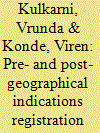

|
|
|
|
|
| Publication |
2011.
|
| Summary/Abstract |
Over the recent past, Geographical Indications (GIs) have emerged as a significant form of intellectual property rights in the Indian context. In view of the commercial potential of handicrafts, adequate legal protection of GIs becomes necessary to prevent their unauthorized utilization. The illegitimate practice of using geographical names not only damages the reputation of the original product, but also deprives the genuine right holders of the returns on investments for developing goods and its reputation in the market. Moreover, the consumers are likely to be misled into purchasing the counterfeits. This paper provides an overview of the current status of registered GIs and their classification with respect to handicrafts and their region-wise registrations. More importantly, this paper focuses on the need to improve the existing pre-and post-registration GI measures along with its reinforcement measures as critical factors to the success of the handicrafts industry in India.
|
|
|
|
|
|
|
|
|
|
|
|
|
|
|
|
| 5 |
ID:
110491
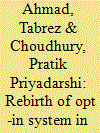

|
|
|
|
|
| Publication |
2011.
|
| Summary/Abstract |
The recent copyright controversy, the Google Books litigation, has revived interest in the role that opt-in requirements can play in copyright law. Google Books sought to make every book in the English language text-searchable. To realize this goal, however, Google intended to scan the text of each such book - thereby making a copy - the right to which was vested in different persons around the world. This number of persons amounted to millions and gaining access to all was an onerous task. So, when the company failed to get permission from all the copyright owners, it gave two options to the authors either to opt-out of the copyright or agree to it by as per the result of a class action litigation. In both these circumstances, the user of the copyright had the right to exploit, without authorization, unless the copyright holder took affirmative action. It is the essence of opt-in system in copyright which reared its head once more along with this controversy. This paper critically examines the protection regime in copyright law and the philosophy of protection given to any author over his/her original creation in the light of the above mentioned controversy bearing a potential impact over the fair use doctrine in copyright law. In the present context of highly digitalized society, the dilemma is whether an opt-out system is the need of the hour or the opt-in system should regain its place.
|
|
|
|
|
|
|
|
|
|
|
|
|
|
|
|
| 6 |
ID:
110493
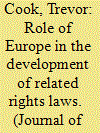

|
|
|
|
|
| Publication |
2011.
|
| Summary/Abstract |
As a European intellectual property lawyer, the author is often struck by the amount of comparative analysis in the area of intellectual property which adopts US intellectual property laws, rather than European ones, as their point of comparison. This seems strange when in many respects US intellectual property laws have their own unique features and when European such laws are often more closely aligned with the laws of most other countries in the world. This series of articles aims to expand knowledge of and to explain something of European intellectual property laws; how they got to their present state, what are current hot topics in them, where they are heading and why they matter. This second article in the series will focus on related rights.
|
|
|
|
|
|
|
|
|
|
|
|
|
|
|
|
| 7 |
ID:
110489


|
|
|
|
|
|
|
|